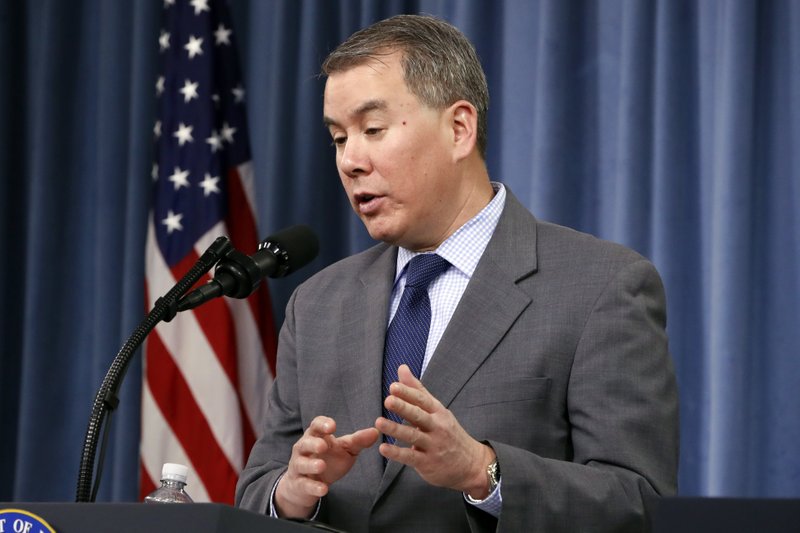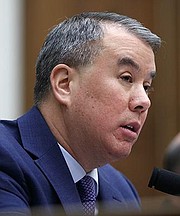WASHINGTON -- President Donald Trump has ousted the Pentagon's top policy official who had certified last year that Ukraine had made enough anti-corruption progress to justify the administration's release of congressionally authorized aid to Kyiv in its conflict against Russia-backed separatists.
John Rood resigned his role as undersecretary for policy on Wednesday, saying he was leaving at Trump's request.
The Trump administration's delay in releasing the aid to Ukraine was central to the president's impeachment by the House on charges of abuse of power and obstruction of Congress. The Senate voted to acquit the president.
Rood is the latest official to be purged. Just days after the Senate vote, the White House reassigned an Army officer who testified in the impeachment inquiry, Lt. Col. Alex Vindman, from the National Security Council, and his twin brother, a council lawyer. Gordon Sondland, Trump's ambassador to the European Union who also was a witness before House investigators, was recalled from his post.
[Video not showing up above? Click here to watch » https://www.youtube.com/watch?v=PzhEYwmTZvE]
Trump tweeted Wednesday that he wanted to "thank John Rood for his service to our Country, and wish him well in his future endeavors!"
Rood, in his letter to Trump, did not mention Ukraine. "It's my understanding from Secretary [Mark] Esper that you requested my resignation," Rood said. Rood said he will step down as of Feb. 28.
"I am grateful for the opportunity to serve with the many talented and devoted professionals in the military and civilian ranks of the Defense Department," Rood wrote. "While much work remains to be done, I am proud of the many accomplishments we have made instituting and implementing the National Defense Strategy, which reshapes U.S. security priorities."
AID AUTHORIZED
Rood wrote in a May 23 letter to Congress that the Pentagon had made a thorough assessment of Ukraine's anti-corruption actions and other reforms. And he said that, "I have certified that the government of Ukraine has taken substantial actions to make defense institutional reforms for the purpose of decreasing corruption."
Rood wrote that his certification, legally required before the aid could be released, was based on insights gained in "persistent U.S. engagement" with Ukraine, including meetings between the U.S. defense secretary and his Ukrainian counterpart.
In an email to Esper hours after Trump's July 25 call with Ukrainian President Volodymyr Zelenskiy, Rood said "placing a hold on security assistance at this time would jeopardize this unique window of opportunity and undermine our defense priorities with a key partner in the strategic competition with Russia," CNN reported. The hold proceeded anyway.
Asked whether Rood's dismissal was related to his certification of the Ukraine aid, chief Pentagon spokesman Jonathan Rath Hoffman said, "I have no information that would lead me to believe that."
"The president has the opportunity and the ability to have the team that he wants to have in policy positions," Hoffman said at news conference. "The president can make a decision to go in a different direction, so I'm not going to speculate on the motivations."
He said Rood's resignation letter spoke for itself.
Rood last year told reporters that, "In the weeks after signing the certification I did become aware that the aid had been held. I never received a very clear explanation other than there were concerns about corruption in Ukraine." He also spoke in favor of releasing the aid, suggesting that withholding it would hurt America's defense priorities.
Pentagon press secretary Alyssa Farah said James Anderson, who is currently serving as the deputy for policy, will take over the job until a permanent replacement is appointed by the president and confirmed.
Esper said in statement that "John has played a critical role on a wide range of DoD issues including modernizing our nuclear deterrence capability, efforts to increase burden sharing by our NATO allies, our Missile Defense Review and implementing the National Defense Strategy. I wish him all the best in his future endeavors."
Rood has served as undersecretary for policy since January 2018, but also had worked in various government agencies including the State Department, the CIA and the National Security Council for more than 20 years. He held senior policy jobs mainly during Republican administrations and also served as a senior policy adviser to Sen. Jon Kyl, R-Ariz.
Rood also was a senior vice president at Lockheed Martin International.
PAST CONTENTION
Rood had differed with fellow political appointees, particularly officials on the White House National Security Council under former national security adviser John Bolton. Several former officials, who spoke on the condition of anonymity to discuss a former colleague, said Rood's advocacy for positions supported by uniformed officials, which often contradicted White House policies, had repeatedly created friction with administration leaders.
The officials said Rood was the subject of White House criticism for his role in the Pentagon's reluctance to provide the White House with plans for a possible withdrawal of U.S. forces from Syria before Trump abruptly announced a pullout in December 2018. Military officials had opposed the move because they did not think the mission against the Islamic State group was finished. Trump later backed away from his decision but eventually reduced the force there.
One former official said Rood also had angered some at the White House by opposing the April designation of Iran's Islamic Revolutionary Guard Corps as a foreign terrorist organization, another position widely shared within military officials.
Rood also differed with White House officials over Trump's desire to ratchet up pressure on Japan and South Korea to pay more for U.S. troops stationed there, according to former officials, who spoke on the condition of anonymity to discuss internal deliberations.
Trump's proposed Syria withdrawal was met with criticism from many military officials, as was a later reallocation of American forces in Syria. The December 2018 announcement, among other issues, led to the resignation of then-Defense Secretary James Mattis, who had brought Rood into the top policy job.
"Very few Mattis people are left, which means very few people to push back," another former official said. "The White House does not want contrary views."
A spokeswoman for Rood at the Pentagon did not respond to a request for comment on those matters.
Information for this article was contributed by Lolita C. Baldor of The Associated Press; and by Paul Sonne, Missy Ryan and Josh Dawsey of The Washington Post.
A Section on 02/20/2020

